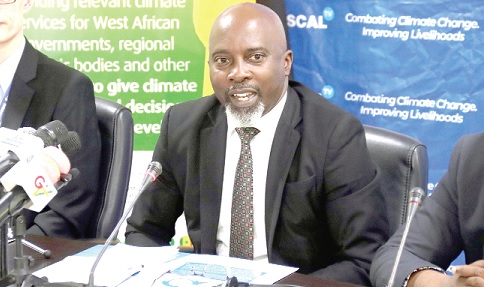The West African Science Services Centre on Climate Change and Adaptic Land Use (WASCAL) has initiated a project aimed at strengthening the adaptive capacities of risk-prone nations to global warming and climate change.
The project is known as “customised and integrated climate and environmental services for improved resilience and sustainable socio-economic development in West Africa (CICLES).
In the next 36 months, the project will receive funding support from the BMBF of Germany and will be implemented in partnership with the Climate Services Centre Germany (GERICS).
This came to light during a press conference following a two-day meeting organised by WASCAL to operationalise CICLES.
The meeting brought together stakeholders from different West African countries and beyond including private sector, non-governmental organisations (NGOs), and government agencies to investigate what the user needed and how WASCAL and GERIC would bring their own solutions in solving climate change issues.
Thematic areas
During the media interaction, the Interim Executive Director of WASCAL, Prof. Kehinde Ogunjobi, said CICLES was under the climate and environmental services mandate of WASCAL and sought to deliver solutions to climate change crisis in the sub region.
![]()
Some participants in the press conference.
He explained that the project would focus on five thematic areas namely data services and scientific computation, migrations under climate hazard, exchange of timely information on extreme climate events, climate action policy and dialogues and on the job, and vocational trainings for professionals to help combat climate change and improve livelihoods in West Africa.
Prof. Ogunjobi explained that on the provision of data services and scientific computation, the results of scientific research analysis would be made available to end users such as farmers, environmentalists and policy makers.
Also, he said, the project would provide timely information on extreme climate issues such as flooding, droughts, coastal erosion, heat waves, the onset and cessation of rainfall.
“Before a farmer goes to plant, they need to know when the rainfall season will start.
There have been false rains which have led to farmers rushing to plant only to realise it was not yet the onset of the rainy season,” he said.
Cross border and rural urban migration, he said, would also be looked at since it had become a serious issue due to the changing climate.
For effective climate policy and action, Prof. Ogunjobi said, there would be the need for West Africa to have experts who would take part in climate negotiations.
“We will provide services for parties from the member countries to provide them with science- based evidence and information that will give them the confidence to argue their points during climate negotiations.
We will be training negotiators,” he said.
Additionally, he said WASCAL would offer short training and vocational training of professionals such as journalists, as well as some farmers.
“Our region is being affected by climate change and such initiatives can help reduce and mitigate the effect of climate change on society,” he said.
Currently, he said, five of the top countries in the world that were vulnerable to climate change were in West Africa.
Partnership
The main goal of CICLES, he said, was to promote climate change resilience, sustainable development and improve livelihoods in West Africa.
He said the project would strengthen risk-prone nations’ adaptive capacity and resilience to global warming and climate change through the co-development of an end-to-end climate and environmental services.
The beneficiaries of the project, he said, would include governments of WASCAL member countries, agencies, policymakers, researchers, students, and private sector players such as banks, insurers, farmer cooperatives, breeders, SMEs and NGOs.
A Scientist at the Climate Service Center Germany, Dr Torten Weber, said the partnership between GERIC and WASCAL was based on the signing of a memorandum of understanding (MoU) to engage in joint activities.

